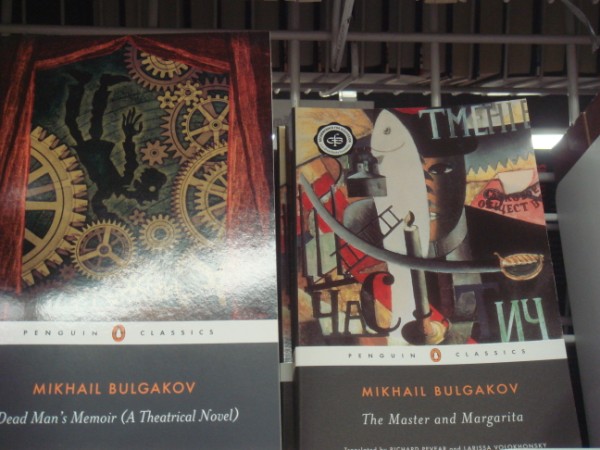Reading “Мастер и Маргарита”: Chapter 18 Posted by yelena on Nov 15, 2010 in language

How much do I love bookstores? So much that I am ready to fly to Moscow for just one day to browse through books at “Библио-Глобус” (one of the largest bookstores in Moscow). While I’m saving up for the transatlantic flight, I shop online and, when possible, on Brighton Beach (Brooklyn, NY). That’s where I saw these two translations of Bulgakov’s works. I took this picture months ago and forgot about it (it’s not the best quality shot). Eerily, the cover image of the book on the left relates very well to the content of this post.
How did you like Chapter 18 of the Master and Margarita? Isn’t it one of the most entertaining chapters so far? The «незадачливые визитёры» [unlucky visitors] are minor characters that are conjured only for short terrifying (to them) and hilarious (to us) encounters with Woland.
And yet, there is so much linguistic richness in their fleeting appearances. For example, Andrei Fokich, the hapless «буфетчик» [bartender], is described by Woland’s maid as «маленький человек» [a little man]. Of course, Andrei Fokich is «малюсенький» [diminutive] in statue, but there’s another meaning behind the maid’s description. «Маленький человек» has a meaning of “insignificant, unimportant person” or “simple folk”, “regular people”:
«Мы люди маленькие. Что начальство прикажет, то и выполняем.» [We are the little guys. What the bosses say we do, we do.]
As you know, not only Andrei Fokich was of short statue and unremarkable personality, but his query to Woland was petty and insignificant in nature. And while we don’t know whether another of the chapter’s “visitors”, Maximilian Poplavsky, was short or tall, his reason for seeing Woland was no less petty than Fokich’s.
A synonym of «маленькие люди» is «мелкая сошка» [a small-timer]. It’s a «пренебрежительный» [contemptuous] way to describe someone who has no influence or significance in the society:
«Да что его слушать! Он же мелкая сошка в этой фирме.» [Why listen to him! He’s just a rank-and-file worker at this firm.]
Here’s what’s really interesting to me. Typically, «маленький человек» [little person], when he appears in Russian literary works from Pushkin to Chekhov, is someone who is essentially a kind and harmless person who means and does no evil.
Yet here, in Master and Margarita, I don’t get the same impression at all. Why? By now we know that Woland and his «свита» [retinue] do not arbitrarily administer their peculiar punishments to both guilty and guiltless. There’s a method to the madness – the guilty ones are exposed and punished.
The way the two «визитёры» [visitors] are treated by Woland leaves little doubt to whether they are guilty or not, don’t you think? We don’t know the exact nature of their wrong-doings. Hey, we don’t even know if Andrei Fokich’s savings were «нажиты нечестным путём» [earned through dishonest means]). But something is fishy.
And speaking of fishy… Did you catch the phrase «осетрина второй свежести» [sturgeon of second-grade freshness]? Coined by Bulgakov, this is now «крылатое выражение» [a catchphrase].
First, a bit of history… It might sound unbelievable, but slightly damaged or past their prime goods, including food, used to be sold, discounted and marked “second-grade”, to general public (yep, to «маленькие люди»). Since in the Soviet Union the government was the owner of all the «товары» [goods] as well as the quality controller, the regulator, and the enforcer, it made a lot of sense to sell instead of to send to a landfill. Combine that with widespread and persistent «дефицит» [lack of] many consumer goods and food items, and you can see that the public wasn’t terribly opposed to the idea of buying something «не первой свежести» [not exactly fresh].
Nowadays the phrase «не первой свежести» and «второй свежести» refers to many things other than food – news, political movements, concerts, theater productions, personal appearances, etc. In general, anything that is outdated, worn-out, used one too many times, irrelevant is said to be «второй свежести» [of second-grade freshness].
But back to our little people… I think one way to interpret Poplavsky’s and Fomich’s punishments is through yet another translation of «маленький человек» – «винтик в машине» [a cog], in a sense of an average person performing routine functions day in and day out.
Many of the crimes, big and little, that are committed by regimes, are committed because of acquiescence of the simple folks, of cogs. Bulgakov’s own tragedy – being cast out, criticized, silenced and ignored – was a testament to the not-so-innocent «маленькие люди» [regular folks].

Build vocabulary, practice pronunciation, and more with Transparent Language Online. Available anytime, anywhere, on any device.



